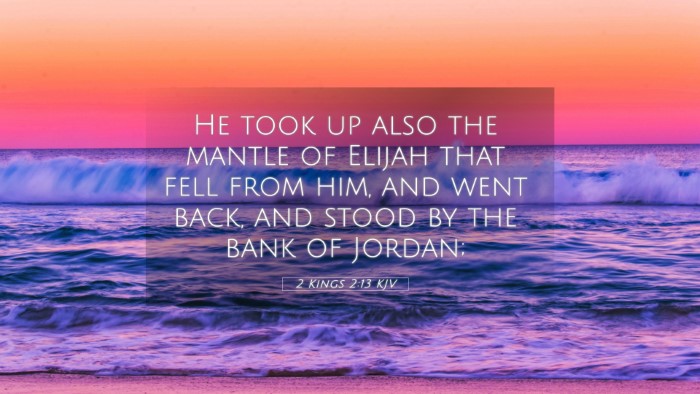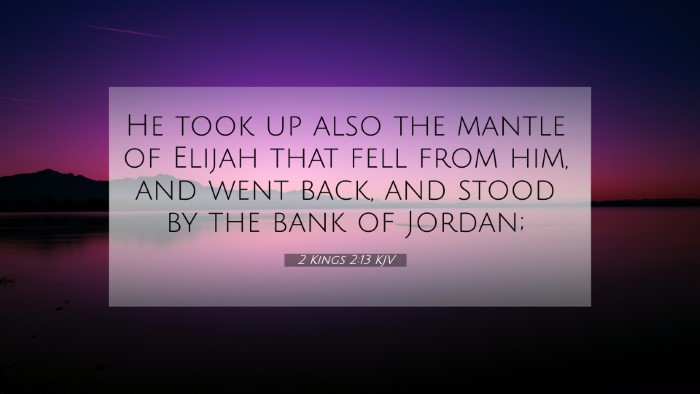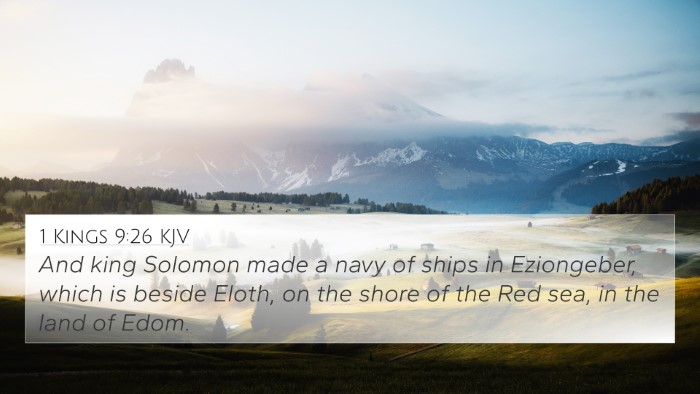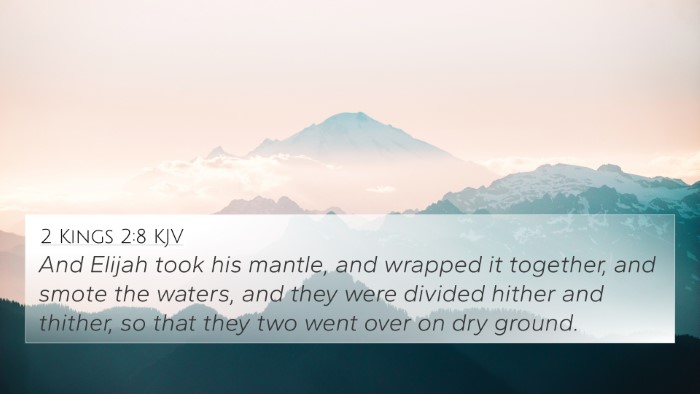Understanding 2 Kings 2:13
2 Kings 2:13 states: "He took up also the mantle of Elijah that fell from him, and went back, and stood by the bank of Jordan." This verse marks a pivotal moment in Scripture where Elisha inherits the prophetic ministry of Elijah. Below, we summarize its significance drawing from renowned public domain commentaries.
Verse Meaning and Significance
This passage is rich with meaning, not just in the immediate context but also in its broader implications. Here are some insights based on the works of Matthew Henry, Albert Barnes, and Adam Clarke:
-
Elisha's Inheritance:
Matthew Henry emphasizes that the taking up of Elijah's mantle represents the passing of prophetic authority and the continuation of God's work on earth. Elisha is depicted as willing and ready to step into the role that Elijah has vacated.
-
The Symbolism of the Mantle:
According to Adam Clarke, the mantle symbolizes not only the prophetic office but also the power and spirit of Elijah. By taking the mantle, Elisha not only inherits the physical item but also assumes the spiritual responsibilities connected with it.
-
Connection to the Jordan River:
Albert Barnes points out that standing by the bank of the Jordan signifies a place of transition. The Jordan River is significant in biblical history as a boundary between the wilderness and the Promised Land, symbolizing both challenge and opportunity for Elisha as he steps into his new role.
Connections with Other Bible Verses
This verse can be cross-referenced with a number of other scriptures, illuminating its deeper meanings and contextual ties. Here are several relevant Bible verse cross-references:
- 1 Kings 19:19-21:
This passage describes Elijah calling Elisha to follow him, setting the stage for this moment of mantle inheritance.
- 2 Kings 2:9:
Here, Elijah asks Elisha what he wants before departing, and Elisha requests a double portion of his spirit, showing his desire for the prophetic calling.
- John 14:12:
Jesus' promise that those who believe in Him will do greater works relates to the idea of continuing ministry through successors.
- Matthew 28:19-20:
The Great Commission reflects the passing of authority to the apostles, paralleling Elisha's receipt of Elijah's mantle.
- Acts 2:17:
This verse discusses the outpouring of the Spirit, tying into the broader theme of prophetic ministry being passed on through the ages.
- 2 Timothy 1:6:
Paul speaks to Timothy about stirring up the gift of God, reminding us of the importance of spiritual inheritance.
- Hebrews 11:32-34:
This passage commends the prophets, including Elijah, for their faith, connecting them to the legacy that Elisha now upholds.
- Colossians 1:27:
It speaks of Christ in us, the hope of glory, reflecting the new covenant parallels to the spirit Elisha receives.
- 1 Peter 2:9:
Describing believers as a royal priesthood resonates with the transition of the prophetic ministry from Elijah to Elisha.
- Luke 9:62:
Jesus' statement about not looking back connects with Elisha's decisive action in following Elijah's path.
Thematic Connections and Analysis
Greater biblical themes emerge through comparative Bible verse analysis regarding prophetic succession, the empowerment of God's chosen leaders, and the significance of faithfulness in ministry. Elisha’s act of taking up the mantle connects to broader biblical principles of discipleship and the importance of spiritual legacies. Here are key insights:
-
Spiritual Authority and Legacy
Elisha's acceptance of Elijah's mantle exemplifies the theme of passing on spiritual authority and the responsibility that comes with it – a legacy foundational to both the Old and New Testament.
-
Preparation and Consecration
Elisha's journey to this moment signifies a process of preparation, paralleling the necessary steps followers of God must take to understand and fulfill their roles.
-
Faith and Obedience
The narrative reflects a theme of faith and obedience, demonstrating how God equips and empowers those He calls.
Conclusion
Understanding 2 Kings 2:13 requires examining the heritage of faith passed from one prophet to another and recognizing the significance of spiritual inheritance in the life of believers today. As demonstrated through various cross-references and commentaries, this verse not only illustrates a historical moment but also serves as a vital lesson on the continuity of God's work through His messengers.
For those studying this verse, it is essential to utilize tools for Bible cross-referencing to uncover deeper connections and thematic dialogues across the Scriptures. Engaging in a comparative study may reveal new insights into how God works through time and the lives He touches.





